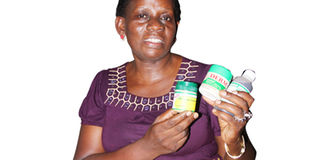Prime
Dr Grace will prescribe you a herbal remedy

Dr Nambatya shows some of her products. Photo by Abubaker Lubowa.
What you need to know:
Her first encounter with herbal medicine was in 1983 is a story already narrated in her short book, the Management of Eczema Through Natural Products. She, however, does not mind sharing it again with Esther Oluka.
When we meet for the interview at her office in Wandegeya at the Natural Chemotherapeutics Research Laboratory offices, Dr Grace Nambatya is dressed in a simple flowered dark blue dress. She starts by narrating the horrific experience of how she was struck by a strange skin ailment in 1983 while in her second year at Makerere University where she was pursuing a Bachelors degree in Science Chemistry.
“I remember panicking after seeing an abnormal rash on that appeared in all my body joints and the neck,” she explains.
Unlike nowadays where one can easily find information regarding a particular condition, Dr Nambatya says back then it was quite difficult because there were not many health facilities or skin specialists.
She recalls visiting a renowned herbal centre in Kampala, which was known as Salonpass Agency, to secure treatment for her condition.
“I was offered certain herbs to take at that clinic. A few minutes after I had taken them, however, I suffered severe diarrhoea and felt completely weak afterwards,” she explains. It was this setback that made her give up on the treatment and continued to search for another cure. While doing her doctoral training in Medicinal Chemistry at Loughborough University of Science and Technology in Leicestershire, Midlands, UK, the programme provided her different opportunities to establish what she was suffering from and how she could best manage the ailment. “I found out that I was suffering from an allergy known as eczema and I used the required herbal treatment to treat the skin ailment,” she explains.
With the knowledge that she had acquired from studying for her doctorate, she decided to venture into making different herbal products that focused on treating various ailments. This was around 1993. She operated from her home in Namasuba, a Kampala suburb along Entebbe Road, and used the services of two workers.
“I have about 10 herbal standardised formulas on the market that I made out of doing my PhD,” she says. Some of these include cough syrups, body creams, fungal infection ointments, herbal soap, a variety of moringa skin oils as well as different mixtures for illness such as sinusitis and ulcers. She uses natural extracts such as lavender, peppermint, rosemarinus and moringa itself.
Some challenges and benefits
Regarding the challenges in Dr Nambatya’s line of business, she says some of the natural extracts are quite expensive as they are imported. The others include limited suppliers of most of the raw materials and negative perception that many people still have towards use of herbal products. “Most people think these herbal products do not work, which is why they opt for western medicine,” she says.
She highlights some of the advantages of using herbal to Western medicine as the former having rich nutrients which are good for building the body. “Most of these herbal drugs are green and therefore, help in production of more blood in the body,” she adds. They are also easily accessible and have a soothing cleansing effect after use.
Her recommendations
On how the hindrances can be solved, Dr Nambatya believes there is need for the government to step in and sensitise the public on the load of good in using herbal products to address different body and skin health challenges.
When I inquire how much she makes from her herbal business, with a broad smile, she replies that the money is good. “In a month, I can make about Shs1m from this business,” she says.
Since Dr Nambatya also holds the position of the Director of Natural Chemotherapeutics Research Laboratory which is a full time job, her husband helps out with the work at Namasumba. The Chemotherapeutics Laboratory, which is under the Ministry of Health, certifies herbal products before they are let on to the market.




